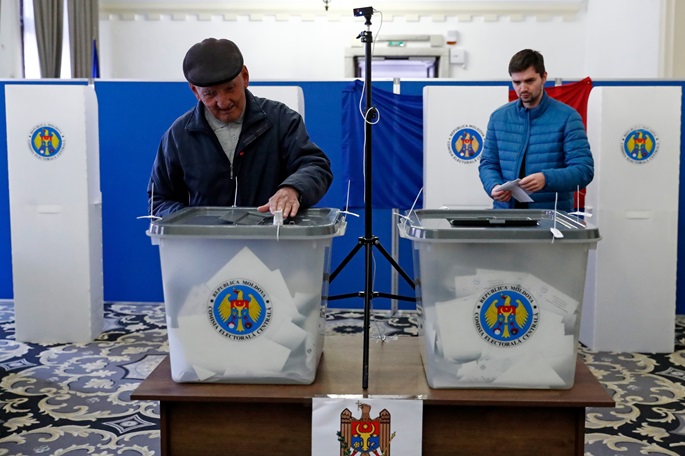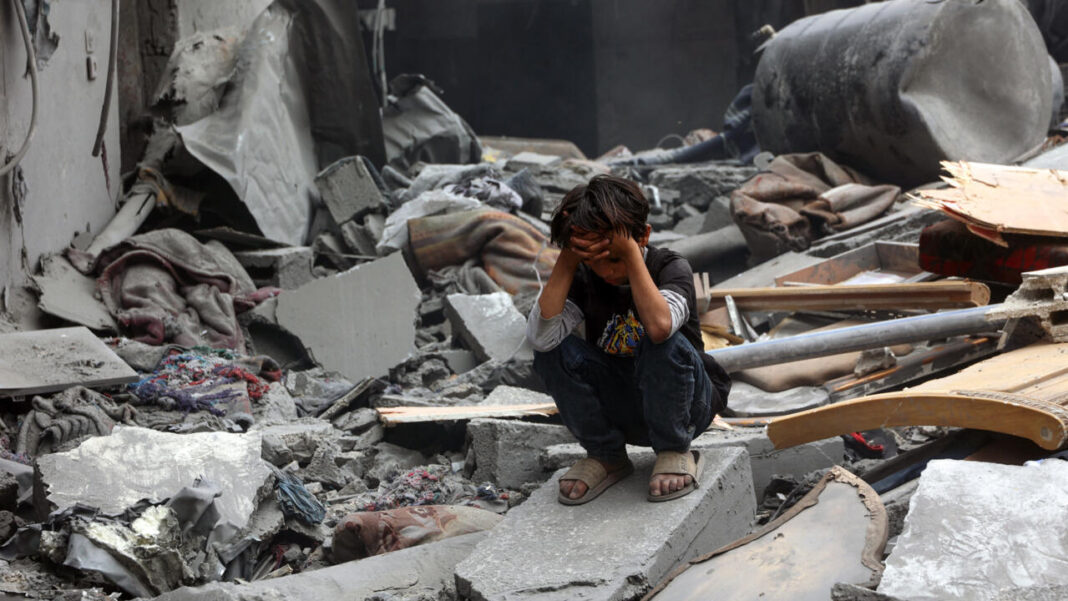Sarah RainsfordSouthern and eastern Europe correspondent in Chisinau
EPA
Prime Minister of Moldova Dorin Recean attends the march on Friday ahead of Sunday’s election.
The crowd filing through central Chisinau waving EU flags on Friday evening was clear: they believe Russia is trying to steal their election and bring pro-Kremlin politicians to power in Moldova.
“Their weapon is money, your weapon is your vote!”, was the loudest chant as several hundred supporters of the governing party, PAS, and its pro-European policies joined the final rally before Sunday’s ballot.
This week Moldovan police and prosecutors disclosed evidence of election interference on an unprecedented scale: vote-buying and disinformation that they link directly to Russia. They’ve also uncovered a plot to foment violent unrest, detaining dozens of men who travelled to Serbia for training including in the use of firearms.
Opposition parties dismiss talk of Russian meddling as a “political show” claiming the government is laying the ground to annul the vote should PAS lose its majority in parliament.
But Moldova took a decisive turn towards EU membership and away from Moscow after Russia’s full-scale invasion of Ukraine. Now the evidence suggests Russia has been investing heavily in restoring its influence.
It’s trying to claw back control.
Protesters gathered on Friday for a final rally before Sunday’s ballot.
Final battle?
Lodged between Romania and Ukraine, Moldova has been independent since the USSR fell apart more than three decades ago. Last summer, it launched EU accession talks in tandem with Ukraine.
Prime Minister Dorin Recean sees these elections as a “final battle” for his country.
“There is constant pressure from Russia,” he told me, as the pro-PAS crowd broke up after its brief march through Chisinau.
“They’re spending the equivalent of more than 1% of our GDP to overthrow our government – on propaganda and false messages.”
Some of that fake-news network – posting anti PAS content for cash – was uncovered in a recent BBC investigation.
It’s linked to Ilan Sor, a fugitive Moldovan oligarch now in Moscow.
In response to the BBC investigation, the Russian embassy in the UK denied involvement in fake news and electoral interference and claimed that it was the EU that had been interfering in Moldova’s election.
All this is happening as Russia’s bombardment of Ukraine escalates and with Moscow accused of ever more hostile activity elsewhere in Europe, like sending drones into Poland.
So PAS is trying to mobilise voters by driving home the danger.
Its bright yellow election flyers are full of promises that the party guarantees EU membership “in the next four years” along with a bounty of European investment and maximum respect in the world.
But the flip side of the paper is dark and disturbing. There’s an image of Ukrainian homes destroyed by war and a warning not to “hand our country over to Russia”.
Then come the faces of Moldova’s opposition leaders and the slogan: “Say no to Putin’s candidates.”
“This is exactly the risk right now here in Moldova,” the prime minister says, justifying using such scare tactics.
The choice for Moldovans
Beyond the shabby Soviet-era blocks of Chisinau city suburbs, a short drive leads to field upon field lined with grape vines. It’s like a mini Tuscany with a lot more potholes.
In Cricova, with the sun beginning to slide, women chat on benches on the main square as their children scramble over a climbing frame.
A family in Cricova, a wine-producing area beyond the Chisinau city suburbs.
Moldova isn’t rich, even in wine-producing spots like this, and huge numbers have left the country to seek better lives and incomes overseas. That’s created a diaspora so large, its vote has become decisive.
Since Russia’s full-scale invasion of Ukraine in 2022, the surge in energy prices has strained the economy even further – to near zero growth.
“The politicians have fancy paper to print their election posters and flyers, but there’s nothing decent for our kids’ schoolbooks,” one of the mums grumbles, displaying a photo on her phone of school books, tattered and torn.
Another says her salary on a factory production line is stuck at around £100 a month but the cost of living has soared. “I don’t know who to vote for, they all make promises,” she shrugs. “Then they do nothing.”
Beyond PAS, the choice on Sunday includes the Patriotic Bloc made up primarily of the Socialist and Communist parties. A key member, Irina Vlah, was barred from running on Friday because of allegations of illicit financing.
Another bloc, Alternativa, posits itself as pro-EU but its candidates include the Chisinau mayor who is banned from travel in Europe’s Schengen zone for unspecified security reasons. He’s appealing the ruling.
Alexei Cotruta, a campaigner for Alternativa, a bloc that posits itself as pro-EU.
In all, there are more than 20 participants, although there’s a minimal threshold to enter parliament.
Tamara, who’s in her 60s, tells me her own vote won’t be decided by a lack of schoolbooks or even salaries.
“We chose the path to the EU, and I want to continue on that path, like everyone else,” she says.
“I wouldn’t want to go backwards. That’s scary! I’ve already been there.”
The opposition
Igor Dodon isn’t scared by restoring relations with Russia. It’s something he actively seeks.
Even as Moscow wages war on Moldova’s neighbour, Ukraine, the former president has three pictures of Russian leader Vladimir Putin among the gallery of photos on his office wall.
He points to other pictures, including old shots with US president Donald Trump and French President Emmanuel Macron, as evidence of his “balanced” politics.
But Putin and his allies dominate the display.
Igor Dodon, former president, is keen on improving relations with Russia.
Dodon is one of the main opposition candidates on Sunday, for the Socialist Party, and shrugs off talk of Russian interference. In July he travelled to Moscow for meetings and says if he wins this election, he’ll oppose all sanctions on Russia “even if Brussels dictates it”.
He’d also revert to buying gas from Russia to cut costs. Why not, he wants to know, if EU members Slovakia and Hungary can do it?
Dodon calls his approach pro-Moldovan, not pro-Russian, driven by profit margins not morals. When pushed, he says the war in Ukraine was the fault of “both sides”.
“We need to have good relations with all. It means we shouldn’t be friends with someone against another,” he argues.
But he’s not at all friendly with President Maia Sandu, who founded PAS, or with her allies.
“If PAS say they’ve won on Sunday, we will show it’s a fix. They can only get a majority by falsification,” Dodon declares, promising a wave of street protests if that happens.
“We will declare a win and defend it,” he says. “We won’t let them cancel the vote.”
A framed photo of Vladimir Putin with Igor Dodon
Unprecedented interference
The only documented efforts to warp Moldova’s elections so far have been by Russia.
“This is one of the most advanced interference campaigns we’ve seen,” Police Chief Viorel Cernăuțeanu says bluntly.
It’s also bigger.
At last year’s presidential elections he says people were being paid up to $40 to vote for pro-Russian forces who then came close to winning.
“We calculate that Russia invested more than $100 million overall last year,” the police chief tells me. “Now it’s more than three times that amount.”
Viorel Cernauteanu, chief of Moldovan Police, has called it the “most advanced interference campaigns we’ve seen”.
The process is more sophisticated too, using crypto currency instead of bags full of cash.
“For the Russian side, Moldova is seen as a territory where they should rightfully exercise influence…within the borders of the old empire,” explains John Lough, head of foreign policy at the New Eurasian Strategies Centre (NEST), a London-based think-tank.
“With very traditional, imperial thinking…they see it as their right to boss Moldova around.
“If they can bring to power a government that is friendly to them then that would be demoralising for the Europeans,” he adds.
There’s also the chance of a firm toehold inside Europe for more hybrid activity and the potential offered by the breakaway Transnistria region that borders Ukraine.
Propped up by Moscow it’s still home to a Soviet-era ammunitions store and a contingent of Russian troops.
A Russia-leaning government “could make things more difficult for the Ukrainians” because of Transnistria, Lough points out.
Moscow has denied the allegations and accused Moldovan authorities of spreading anti-Russian rhetoric.
“The authorities are so afraid of the elections that they are hampering the nomination of candidates, participation in the vote, and observation of the vote,” Russia’s Foreign Ministry spokeswoman Maria Zakharova said in a statement this week.
Disorder
For police chief Cernăuțeanu, it’s the plot for violent unrest that’s most serious.
More than 100 people – mainly “athletic” men, he tells me – were detained for attending training in Serbia, including on breaking through police lines and seizing weapons.
Two were linked to the political structure of Dodon. The former president says the party is still checking its records.
On Friday, Serbian police announced the arrest of two men suspected of organising the training for up to 170 others. Moldova believes Russia’s GRU military intelligence was involved.
“I don’t think anyone in Europe has experienced anything like this interference,” Mr Cernăuțeanu says.
“Ahead of the vote we’re working 24/7 to minimise the risks. But we understand very well that Russia will try absolutely all methods to achieve what it wants.”





